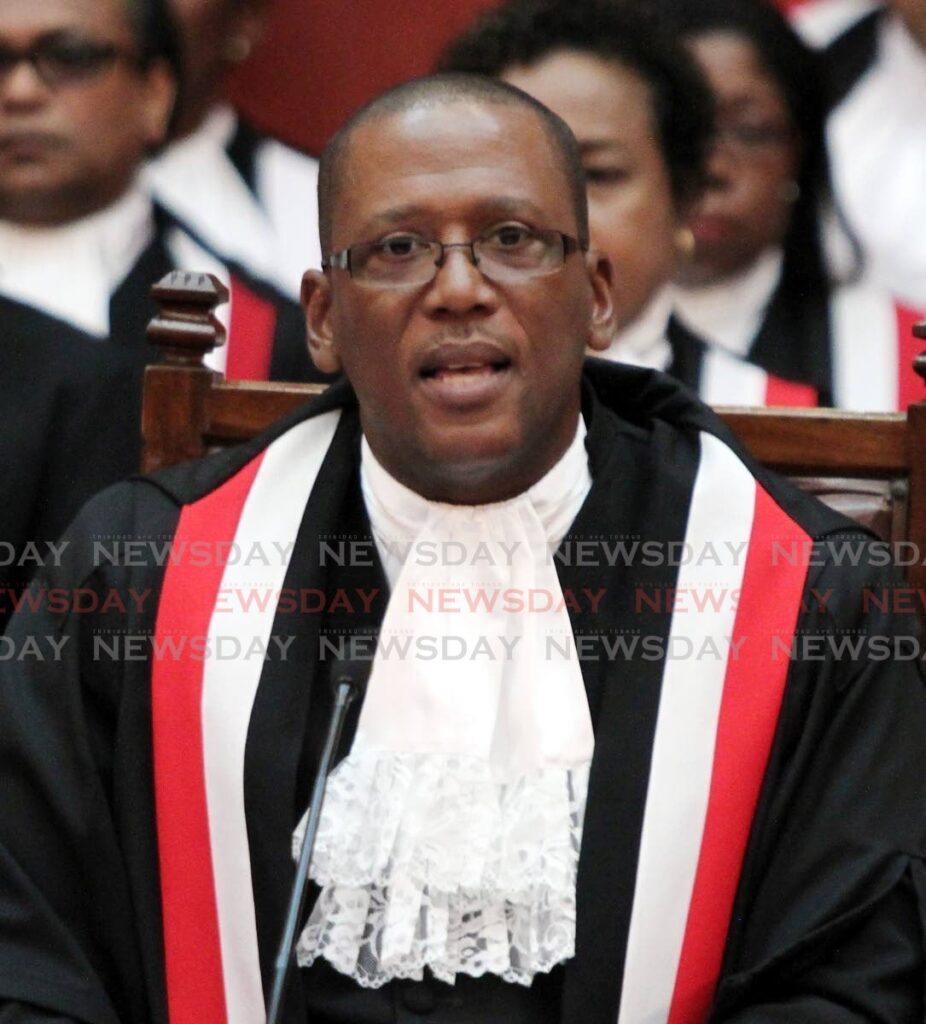By Jada Loutoo
Copyright newsday

Chief Justice Ivor Archie has reported steady gains in court performance, infrastructure modernisation, and digital reforms during his annual address to mark the opening of the 2025–2026 law term on September 16.
He also outlined ambitious plans while reflecting on his 17 and a half years at the helm of the judiciary.
Archie announced his early retirement during what was his final address as chief justice to colleagues, the legal fraternity and the nation on Tuesday.
“There is another core purpose served by the Chief Justice’s speech at the beginning of every law term: accountability. The Chief Justice is responsible for the realisation of the judiciary’s vision.
“He or she (with input and assistance) is responsible for crafting the strategic direction for the judiciary and ensuring that it is brought to fruition. He/she must therefore account for the judiciary’s performance under their stewardship.”
In doing so, Archie said that despite resource constraints, case disposition was improving across divisions. The Criminal Division of the High Court determined 256 indictments between January and June 2025, compared with 393 for the entirety of 2024. Notably, 95 of those cases were filed after the Administration of Justice (Indictable Proceedings) Amendment Act (AJIPAA) took effect in December 2023, with an average completion time of 11 months, a significant drop from pre-AJIPAA cases that often stretched over a decade, he noted.
“AJIPAA is working…The addition of more criminal masters to assist with case management has definitely made a difference, and, bearing in mind that the increase in their numbers has only been from this year or less than half of the time since AJIPAA was proclaimed, we expect to see further gains.
“I should caution, however, that a way must be found to assist the DPP whose department is suffering from a staff shortage that threatens gains that have and can be realised.”
He also credited the progress to plea arrangements, sentence indications, additional criminal masters, and growing acceptance of judge-only trials. Seventy-three per cent of AJIPAA matters and 62 per cent of pre-AJIPAA matters were resolved without trials, easing the backlog. Archie suggested that bench trials should become the default, as, according to him, the public demand was for speedier outcomes.
Other divisions reported mixed trends. The Children’s Court completed 347 matters in the first half of 202,5 but faces challenges following the closure of the Civilian Conservation Corps.
“We note with concern that the Civilian Conservation Corps apparently has been shut down. This presents a challenge for our commitment to therapeutic and restorative justice because it was a major alternative to incarceration for young persons who need to be redirected from a trajectory that would lead to habitual re-offending.
“This will have to be the subject of an urgent conversation with the government,” Archie said.
The Civil High Court recorded a clearance rate of 89 per cent. The Family Court nearly matched filings with determinations, with domestic violence cases still burdening the docket. District Criminal and Traffic Courts (magistrates’ courts) saw filings fall 13 per cent, though clearance rates rose slightly to 58 per cent amid a shortage of magistrates.
“The fact that clearance rates have therefore crept up should not obscure the fact that there is a critical shortage of magistrates, which the JLSC is currently addressing.
“We are in the middle of a recruitment process and have shortlisted candidates for interviews,” Archie said.
The Estates Administration Office doubled its grant clearances in 2024 and maintained momentum in 2025 with more than 3,100 grants signed by July. Archie highlighted the Probate Registry E-Services platform as a major step toward transparency and efficiency.
Court building upgrades
Speaking about the judiciary’s court infrastructure agenda, Archie acknowledged chronic problems with court buildings, past design flaws and lack of judicial input while assuring, “our commitment to delivering safe, functional, and future-ready facilities remains firm.”
“We do not want to be in the construction business, but our institutional memory is shaped by past experiences—which have left lasting consequences… that stand as sobering reminders of what happens when facilities are constructed without meaningful consultation and collaboration with the judiciary, these facilities remain underutilised and, in some respects, unfit for purpose.”
He said the judiciary was working closely with the Ministry of Justice to ensure facilities meet operational needs.
“That said, everything that is done now is shaped by current fiscal constraints that dictate a re-prioritisation of ongoing and future projects.”
He highlighted issues with the Port of Spain District Court and the San Fernando Supreme Court.
“The reason for these results can be traced back to the ownership and management of the judiciary buildings…We must be clear about who is the ultimate client as opposed to the project manager. Construction and refurbishment must be done in accordance with approved judiciary-design briefs.”
The San Fernando Supreme Court project, originally budgeted at $12.8 million, has ballooned to $22.1 million, plagued by shifting designs and the termination of contractors. Similarly, the Port of Spain District Court remains shuttered, with the government asked in July to approve an additional $9.1 million to complete works. So far, $16.6 million has been spent without reopening.
According to Archie, active projects include the continuing restoration and upgrades at these two courts – expected to take a further eight months to complete with delivery in the latter part of 2026 – and new homes for Family Courts in Port of Spain and San Fernando. A Tobago Family Court and expanded virtual access centres for prisoners at the Maximum Security Prison, Arouca, are also on the agenda.
Renewed call for autonomy
In his usual wide-ranging account, the Chief Justice admitted that administrative challenges persist, particularly staffing shortages and inequitable pay structures.
“We depend on external stakeholders for staffing and compensation decisions.”
Archie said some masters of the High Court remain underutilised due to a lack of support staff, and family courts risk closure without urgent action.
“Another Cabinet Note, delayed after years of negotiation, affects staffing across the judiciary, including the absence of staffing for Princes Town Family Court, which was operationalised in 2021 with staff who were reassigned from other locations. The court now risks closure.”
He again called for structural reform to give the judiciary greater operational autonomy.
“We also note the Prime Minister’s recent comments on contract employment and hope for meaningful dialogue on autonomy and structural reform.”
According to the Chief Justice, over the past year, the judiciary introduced a Centralised Court Office at the Criminal High Court and specialised case tracks for backlog and sexual offence matters.
Backlog reduction initiatives disposed of long-pending cases, reduced transmission delays for committal bundles by 93 per cent, and digitised warrant monitoring.
Technology upgrades have also advanced significantly. Three jury courtrooms were added at the O’Meara Judicial Centre, and 18 courtrooms at the Hall of Justice were equipped for hybrid proceedings with modern digital evidence tools. The judiciary also launched a self-help portal and an innovation lab to test emerging technologies, including artificial intelligence.
In family justice, new facilities are nearing completion in Arima, San Fernando, and Tobago. The Social Services Unit expanded services, with family counselling up 77 per cent and supervised access covering 92 active cases.
Future plans
Looking ahead, Archie said the judiciary will launch simplified procedures for small estates and petty civil matters, expand mediation services, and introduce a Small Claims Court. Virtual Access Centres are being extended to rural areas.
The judiciary is also preparing to livestream proceedings from the Court of Appeal, followed by the Criminal Division, in a bid to improve transparency. Artificial intelligence tools will be tested to assist self-represented litigants, improve scheduling, and enhance case management, though Archie stressed that “AI will never replace the human values that define justice.”
Reflections and retirements
He also used the occasion to reflect on nearly two decades of judicial reform under his leadership, including the establishment of specialised courts, the introduction of plea bargaining, digital case management, and e-filing and also recognised the impending retirements of Justices of Appeal Nolan Bereaux, Prakash Moosai, and James Aboud, along with Justices Joseph Tam and Allyson Ramkerrysingh. Recently retired Justice of Appeal Malcolm Holdip was praised for going the “extra mile” with his bail boys project.
“In a real sense, we are witnessing a generational baton passing; it is not just at the level of the Chief Justice.”
Concluding his address, Archie reaffirmed the judiciary’s commitment to delivering justice that is efficient, transparent, and responsive to citizens’ needs. “We are in a much better place than we were in 2008,” he said. “But our work is not done.”



